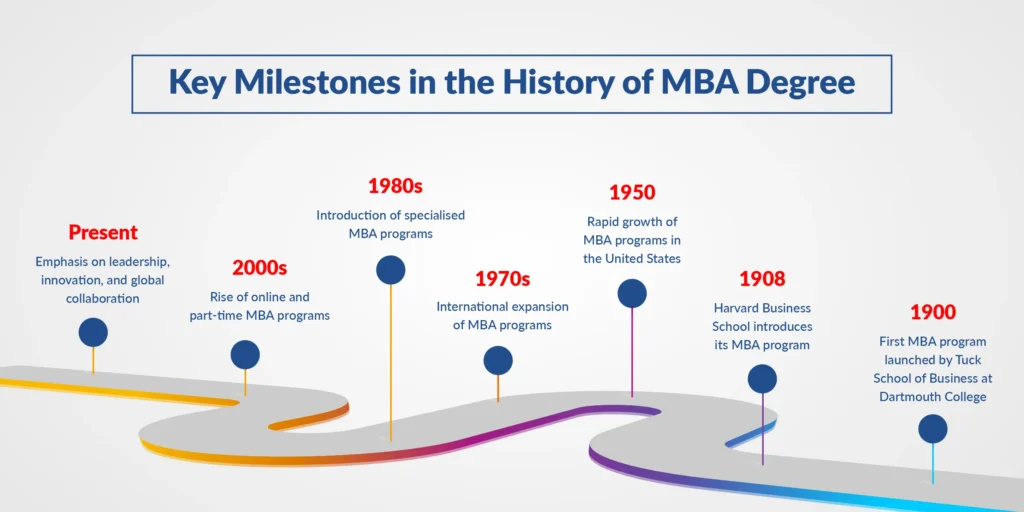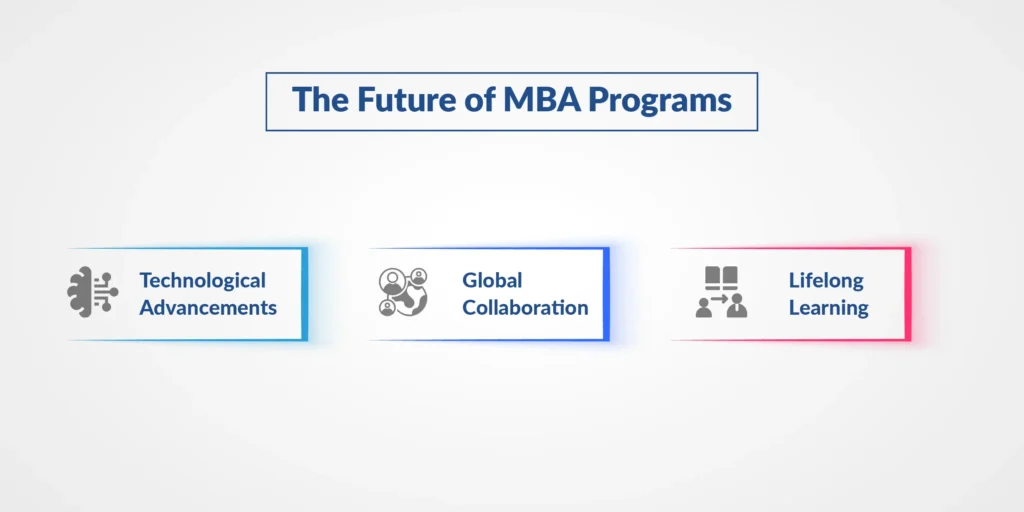The History of MBA Degree: A Journey Through Time
Welcome to a fascinating journey through the history of MBA degree! Have you ever wondered how the Master of Business Administration (MBA) degree came to be? This blog will take you through its origins, evolution, and how it has shaped the world of business education. By the end, you’ll know all about the history of an MBA and its impact on careers and industries around the globe.
Key Milestones in the History of MBA Degree

Given below are the key events shaping the history of MBA degree evolution:
|
With a clear understanding of the history of MBA degree, we can appreciate its significant impact on business education and its continued relevance in today’s dynamic world.
The Birth of the MBA: Early Beginnings
1. The Industrial Revolution
It was propagated during the Industrial Revolution in the late 19th century as an educational program for business. The 1970s and 1980s were crucial decades in the history of MBA degree as the program began to gain international recognition.’
Companies were expanding, and society’s demands required management professionals to deal with massive organisations and new ventures. Management education also started at this period and developed into a modern institution.
2. The First MBA Program
The Tuck School of Business at Dartmouth College introduced the first MBA program in the United States in 1900. This program was a response to the growing need for advanced business education. It marked a significant milestone in the history of MBA degree, setting a precedent for future business schools.
3. Harvard Business School’s Contribution
The first MBA program was developed at Harvard in 1908, setting the standard for business education worldwide. The current convenient vehicle for teaching at HBS is the case method. This innovative pedagogy was hailed as revolutionary at the onset of the MBA movement and remains central to the MBA experience.
Harvard’s influence on the history of MBA degree is immense. It popularised it and made it a prestigious qualification.
The Growth and Expansion of MBA Programs
1. The 20th Century Boom
2. International Expansion
The 1970s and 1980s were crucial decades in the history of MBA degrees as the program began to gain international recognition. The expansion of MBA education reached new heights as numerous business schools across Europe, Asia, and other regions started offering the program to the global public. This expansion helped foster a healthy, complex, intricate society filled with professional businesspeople.
3. The Rise of Specialised MBA Programs
MBA programs also changed their forms during business changes and became more developed. The causes of the history of MBA degree brought about the development of MBA specialities in finance and marketing, healthcare, and technology. These programs enabled students to choose the specialisations of their MBA courses about various sectors, thereby making the MBA course even more beneficial.
Modern MBA Programs: Adapting to a Changing World
1. Online and Part-Time MBA Programs
In the recent past, the MBA degree has undergone several changes, including the development and widespread use of online and part-time programs. There are abundant opportunities for flexibility that ensure working professionals do not have to quit their jobs to attend MBA schools. Online programs have contributed to MBA accessibility for international students wishing to earn their degrees.
In recent years, the history of MBA degrees has seen the rise of online and part-time MBA programs, offering flexibility for working professionals. Some of the best online MBA programs are available at Amity University, Manipal University, Symbiosis, OP Jindal University, and many more, making quality education accessible globally.
2. Focus on Leadership and Innovation
Current MBA schools stress leadership, creativity, and ventures. The curriculum is structured to prepare the learners to work effectively in the challenging business environment of the current world. The development of the MBA degree is a sign of an expanding view of how to teach management, which has moved away from being solely a technical curriculum to incorporating more interpersonal and moral aspects of leadership.
3. Global Accreditation and Standards
Standard-setting bodies such as the Association to Advance Collegiate Schools of Business (AACSB) and the European Quality Improvement System (EQUIS) are essential in ensuring the high quality of MBA programmes. BGSOC members’ accreditation is necessary to guarantee that business schools deliver quality programs, thus adding reliability to the MBA degree.
The Impact of MBA Graduates on Business and Society
MBA graduates can have positive impacts on businesses and society in general. Let’s explore some of them:
1. Career Advancement
When one considers how the MBA degree has developed throughout the years, one can identify the promotion of career growth as a critical factor. Due to the popularity of the MBA, most of its recipients have leadership responsibilities in most organisations. An MBA degree provides employability for various fields through the skills and knowledge imparted to candidates while pursuing the program.
2. Entrepreneurship and Innovation
Many MBA graduates become successful entrepreneurs by taking stiff business risks and chasing growth. The narratives from completing an MBA degree are rich, with many examples of true success and dynamic entrepreneurs who have impacted the business world through start-ups.
MBA programs promote an environment of new venture creation, as students are encouraged to develop innovative ideas worth betting on.
3. Social Impact and Corporate Responsibility
Today’s MBA programs also focus on social and company responsibility. Until recent years, graduates have been unduly preoccupied with the financial returns of business policies and plans. They have not been given similar stimulus to contemplate the favourable incidence of their policies and plans for society.
It is essential to understand this aspect of the history of MBA degree, which concerns the transformations of the role of business education aimed at ethical and sustainable change.
The Future of MBA Programs

1. Technological Advancements
The future of the history of MBA degrees continues to be incorporated with technological advancements. Technological advancement is inevitable; thus, MBA programs require change by embracing advanced technology in instructional tools or methods to meet the ever-evolving market.
This will bring about positive changes for the future, starting with creating competent graduates who can face the problems and complexities of the digital world.
2. Global Collaboration
Another significant trend in the history of MBA degree is globalisation. New developments in this area include alliances between business schools and other institutions in various parts of the globe for twinning and exchanges. This comprehensive approach to MBA learning provides students with a global outlook on today’s interconnected business world.
3. Lifelong Learning
Learning as a continuous process throughout the life cycle is one of the issues that has received a boost in the history of MBA degree. Through knowledge, business professionals must ensure that they develop skills to be relevant in the constantly changing market.
MBA programs are evolving to offer alumni ongoing education and support, helping them navigate their careers long after graduation.
Conclusion
The existence of an MBA degree is quite an interesting topic in terms of telling the story of establishing and developing this degree and giving vital evidence of postmodernism in action. Initially offered in only a few specialised universities, such as Dartmouth College MBA, the concept has evolved over the years to provide a standard for MBAs worldwide.
No other system in the world has given careers to numerous people and revolutionised industries all over. The history of the MBA degree is to help students learn more about this type of degree so they can ask for it when it comes to advancing their careers in the business world.
To explore the best MBA specialisations and make an informed decision, visit Hike Education’s official website for expert guidance tailored to your career goals. Unlock your potential with an MBA degree.
History of MBA Degree: FAQs
Q1. What is the origin of the MBA degree?
The MBA program was started at the Tuck School of Business at Dartmouth College in 1900 to address the need for skilled managers during the Industrial Revolution.
Q2. How did Harvard Business School influence the MBA degree?
In 1908, Harvard Business School launched an MBA, which helped establish the use of the case method with students and emerged as the global model in business education.
Q3. When did MBA programs start gaining international recognition?
MBA programs got more attention in the early 1970s and 1980s, and during this period, most of the business schools in Europe, Asia and other parts of the world started offering MBA programs.
Q4. What are some modern trends in MBA programs?
Contemporary tendencies comprise the popularity of such online and part-time MBA programs, the stress on leadership, innovation, international cooperation, and mastering a continuous learning perspective.
Q5. Why is the MBA degree valuable for career advancement?
The MBA degree is worthwhile because MBA graduates acquire critical skills for doing business, get access to leadership roles, and grow a network of contacts.
Our Programs
Recent Blogs



- Amity University Online MBA
- Shoolini University Online MBA
- Sharda University Online MBA
- Uttaranchal University Online MBA
- Symbiosis Online MBA
- Jain University Online MBA
- Manipal Online MBA
- OP Jindal University Online MBA
- LPU Online MBA
- NMIMS Online MBA
- DY Patil Online MBA
- UPES University Online MBA
- IIM Kozhikode Online MBA
- MICA
Online MBA Specialisations
- Amity Online MCA
Online MCA Specializations
Copyright ©2025 All Rights Reserved by Hike Education Pvt. Ltd.











.png)

.png)




